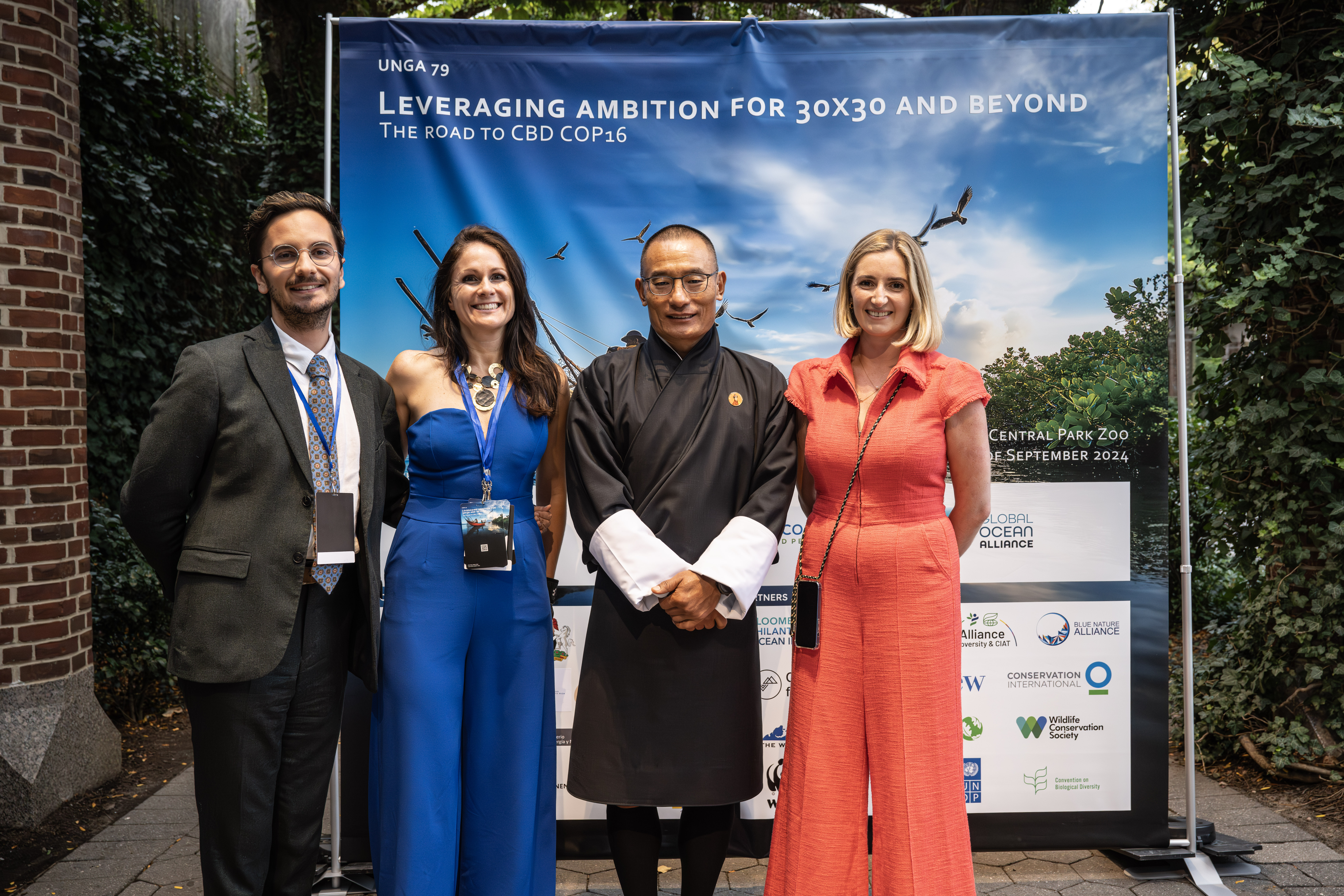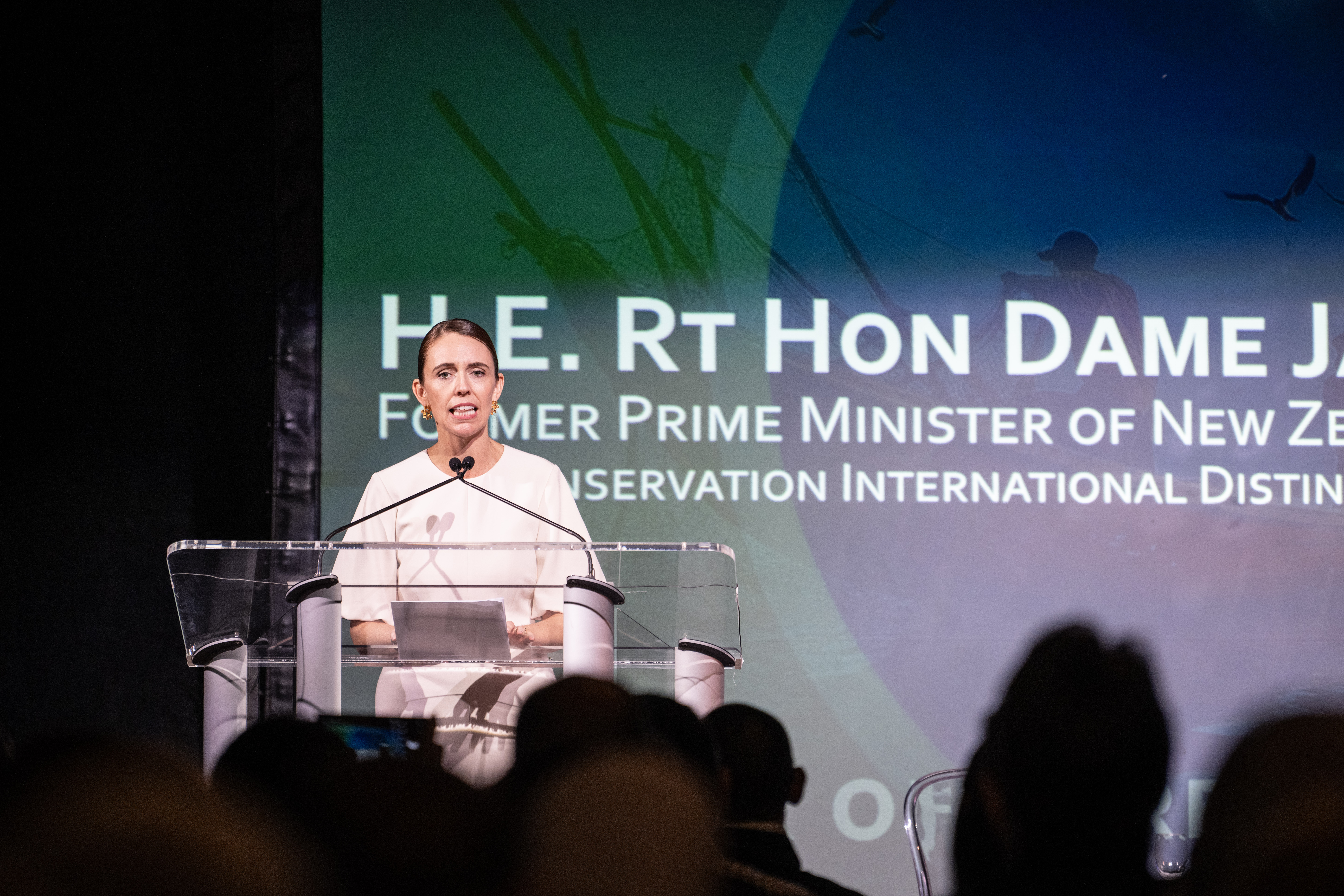UNGA 79: Ocean Conservation Should be a Priority Amidst Political Divide and Geopolitical Tensions
Blog
As the 79th United Nations General Assembly (UNGA) concluded, geopolitical tensions dominated much of the global discourse. The geopolitical landscape is fraught with division, yet the challenges facing our planet's oceans are universal. No nation can escape the consequences of a warming ocean or collapsing marine ecosystems, which will only continue to increase conflict, displacement, and the geopolitical divide if not addressed urgently.
Ocean diplomacy and ocean conservation as a means to peace is not only a proven model but needs to be at the forefront of everyone's agenda. Historically, the Antarctic Treaty System has been a model of peaceful international cooperation. Since its inception in 1959, it has preserved Antarctica as a scientific preserve, free from military activity and dedicated to peace and science. The success of this treaty proves that even during the height of the Cold War, nations could find common ground in pursuing something greater than themselves. Today, we have an opportunity—and an obligation—to build on this legacy by extending protections to the Southern Ocean and beyond.
Despite geopolitical tensions dominating much of the global discourse, the urgency of accelerated, quality, inclusive, and meaningful ocean conservation was emphasized at this high-level week. The drive to secure the health of our oceans under the Biodiversity Beyond National Jurisdiction (BBNJ) treaty has emerged as a beacon of hope but let us not forget about the existing commitments under the Paris Agreement for Climate Action and the Kunming-Montreal Global Biodiversity Framework.

1. A Pact for the Future with ocean conservation as an important action: World leaders adopted a Pact for the Future at the Summit of the Future, where ocean conservation features as one of the key priorities.
2. Increase in momentum to protect the High Seas: The race to have the High Seas Treaty into force by the third UN Ocean Conference in France next June was visible throughout the high-level week. As of September 26th, 102 countries had signed, and 13 countries had ratified the High Seas Treaty, and this was also brought to the fore through a high-level event on High Seas MPAs early starters. The treaty will allow the creation of essential large-scale marine protected areas in the vast ocean space that belongs to no one and yet belongs to us all.
3. There is some encouraging progress on the Kunming-Montreal Global Biodiversity Framework and its global target to protect 30% of the ocean by 2030. Still, there is much more to do: We also saw some encouraging progress at the Leveraging ambition for 30x30 and beyond: The road to CBD COP16. This High-Level Event, 'Leveraging ambition for 30×30 and Beyond: The Road to CBD COP16,' took place on September 24th and encompassed both a closed-door Ministerial roundtable on resource mobilization, a key linchpin in whether we succeed or not in protecting our planet, and then a high-level reception on progress towards 30×30. The proceedings saw world leaders and representatives from across civil society come together to send a strong signal that they remain committed to delivering on the promises made at COP15 in Montreal.
His Royal Highness, the Prince of Wales, reiterated the aim of the Earthshot Prize to nurture, accelerate, and scale ground-breaking innovations that will repair and regenerate the planet whilst driving prosperity for all. This year, the nomination of the High Ambition Coalition for Nature and People to the Earthshot prize in the "revive our oceans" category demonstrates that the Kunming-Montreal Global Biodiversity Framework and its global target to protect 30% of the ocean by 2030 needs to be at the core of every governments' efforts.
At the event, the Master of Ceremony, H.E. the Right Honourable Dame Jacinda Ardern, former Prime Minister of New Zealand, reminded us of the immediate opportunity to protect up to 26% of the Antarctic's Southern Ocean by 2026 and the urgency for both CCAMLR members to adopt these and for G20 leaders to deliver on their 2023 commitment of the leaders' declaration. Together with existing protections, four large-scale MPA proposals based on the best available science are ready to be adopted and would represent a significant contribution towards conserving 30% of the world's ocean, also featured in a special piece of Time 100, in a Climate Week Opening Speech and in an interview on Good Morning America. Right Honourable Dame Jacinda Ardern closed the event by calling for us all to unite to accelerate ambitious action on biodiversity on the eve of the COP16 of the Convention on Biological Diversity.

Yet, as the discussions at UNGA revealed, the geopolitical divide is impossible to ignore. Some nations remain hesitant to fully commit to international frameworks for fear of ceding sovereignty or economic control, and geopolitics' complexities continue to hinder ocean protection implementation at scale, in spite of 86% of people wanting to see their country set aside geopolitical differences and work together on climate change. While leaders acknowledge the interconnectedness of ocean health and climate, moving beyond declarations to sustained action remains a challenge in such a fractured world.
Active Blue Nature Alliance engagement
The Blue Nature Alliance works across 42 ocean sites with over 100 partners globally to catalyze momentum for large-scale ocean conservation with the goal of conserving 24.9 million Km2 towards conserving 30% of the global ocean by 2030 in the high seas and in national exclusive economic zones.
Since 2020, our partnerships have resulted in 187,000 km2 of protected ocean under more effective management and 1.857 million km2 of ocean under new or expanded protection, including 685,000 km2 under upgraded protection levels.
We have played a catalytic role in:
- The development of 11 sustainable financing plans or mechanisms to promote conservation durability.
- The conservation of 638 endangered and vulnerable species.
- Reaching 1,159 people through learning and capacity development opportunities.
- Publishing over 200 research and knowledge products.
- Leveraging 6.3 times the amount of funding committed by the Alliance.
This UNGA was a key opportunity to encourage further action and continue supporting governments, Indigenous peoples, and other partners to do more and faster by taking part in all these opportunities, from listening to community leadership in ocean conservation to government action.
Ocean Diplomacy in a Changing World
In a world increasingly fractured by geopolitical tensions, the ocean remains a common ground for diplomacy. UNGA 79 underscored the importance of ocean diplomacy, with nations like France, China, South Korea, and the Pacific Island states playing critical roles in driving the ocean agenda forward.
A Call to Accelerate Action
While UNGA 79 highlighted both progress and challenges, it is clear that the fight for ocean conservation is at a pivotal moment. The momentum around the BBNJ Treaty shows that collective action is possible, even in times of great division. But the faltering momentum around the Paris Agreement for Climate Action and the lack of progress towards 30 by 30 of the Kunming-Montreal Global Biodiversity Framework should serve as a wake-up call.
For the ocean to remain a unifying force and a symbol of global cooperation, greater efforts must be made to align political will with the urgency of environmental protection. This means addressing the financial gaps in biodiversity conservation, enforcing existing agreements, and ensuring that geopolitical tensions do not derail the most important global environmental initiatives of our time. In fact, they are some of the most lasting legacies current leaders can leave for today and future generations.
As we look toward the future, the ocean stands as a vital part of the solution to the twin crises of biodiversity loss and climate change. The stakes are simply too high—for the ocean, our climate, and future generations.
The time to act is now. If we are to safeguard the ocean and all its biodiversity, the world must put aside its differences and come together to meet these challenges head on, as 86% of people are expecting from world leaders.
This article was initially posted in Claire Blanchard's LinkedIn profile. She is the Blue Nature Alliance’s Global Advocacy and Political Strategy Lead and was part of the delegation that attended the 2024 UNGA High-Level week.